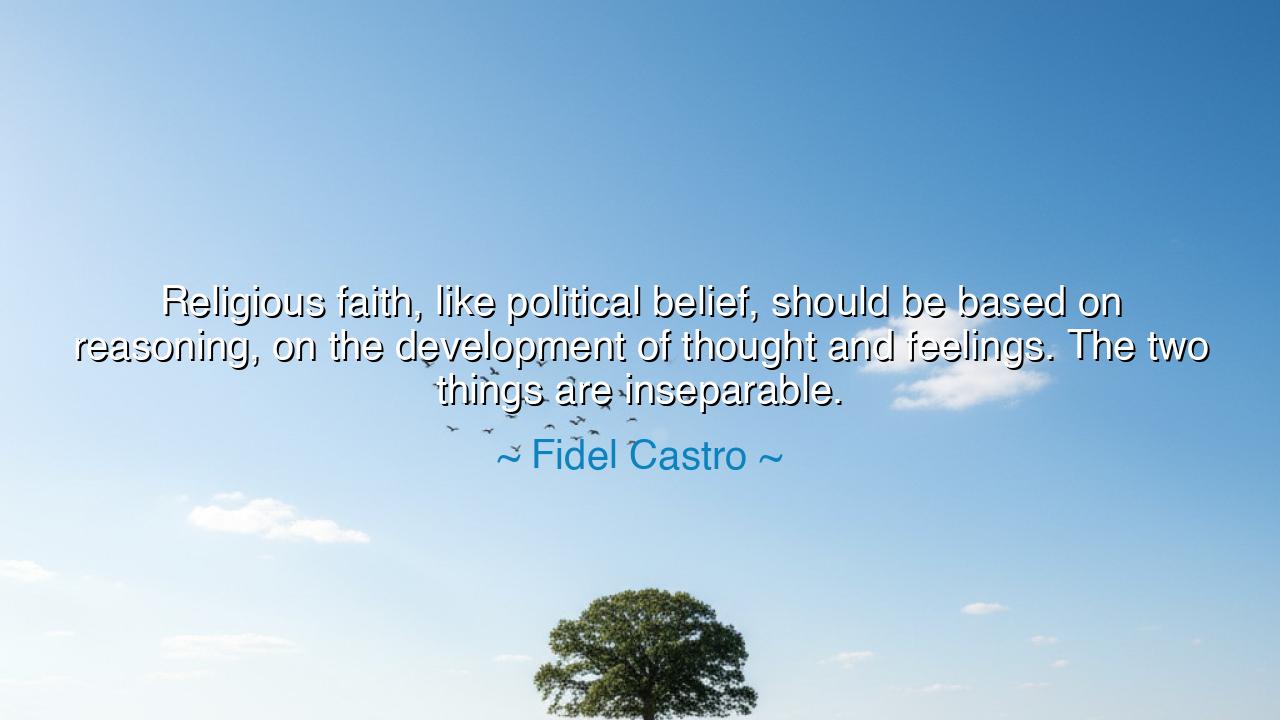
Religious faith, like political belief, should be based on
Religious faith, like political belief, should be based on reasoning, on the development of thought and feelings. The two things are inseparable.






Host: The café was peaceful, with the soft murmur of conversation and the occasional clink of coffee cups filling the air. The late afternoon light bathed the room in a warm, golden glow. Jack and Jeeny sat at their usual table, their coffee mugs resting in front of them. Jack seemed lost in thought, his fingers absentmindedly tracing the rim of his cup. Jeeny, sensing his mood, waited for him to speak.
Host: After a while, Jack looked up, his voice thoughtful.
Jack: “I came across a quote from Fidel Castro today. He said, ‘Religious faith, like political belief, should be based on reasoning, on the development of thought and feelings. The two things are inseparable.’ It made me think about how we often separate belief systems — like religion and politics — from reasoning and critical thinking. Castro seems to be saying that both faith and political beliefs should evolve from thought and reflection, not just blind adherence. Do you think that’s true? Should our beliefs, whether religious or political, be grounded in reason?”
Jeeny’s eyes softened, her expression calm but thoughtful as she listened. She set her coffee cup down gently before responding.
Jeeny: “I think Castro’s point is important because it speaks to the need for critical thinking in all aspects of our beliefs, whether religious or political. Faith, as he suggests, shouldn’t be something we accept without questioning. It should evolve and be informed by reason and reflection. Otherwise, it becomes dogma, which can limit personal growth and understanding. When we truly engage with our beliefs, test them, and question them, they become much more meaningful. It’s about finding a balance between intuition and reasoning, where thought and feeling work together to shape a deeper understanding of who we are and what we stand for.”
Host: Jack nodded slowly, clearly reflecting on her words. The quiet atmosphere of the café seemed to deepen, and his fingers stilled on his cup as he considered the idea of beliefs being grounded in both reason and emotion.
Jack: “So, it’s not just about blindly following what we’re taught or what we feel in the moment. It’s about critically engaging with our beliefs — whether they’re religious or political — and evolving them over time. Our beliefs should grow and be refined by both reasoning and our emotional connection.”
Jeeny smiled gently, her eyes steady with understanding as she responded.
Jeeny: “Exactly. When we approach our beliefs with openness and a willingness to question, we’re not rejecting faith or conviction, but allowing them to be stronger and more resilient. Faith and politics are about the search for truth, and truth doesn’t come from just accepting things as they are — it comes from testing, reflecting, and growing. The best belief systems are those that embrace reason and allow for personal development.”
Host: Jack leaned back in his chair, a small smile forming as the realization settled in. The café around them continued its usual rhythm, but inside, the conversation had opened up a deeper understanding of the nature of belief.
Jack: “So, in a way, critical thinking and reason are just as important in matters of faith as they are in politics. It’s about ensuring that our beliefs are well-founded and not just products of tradition or emotion alone.”
Jeeny nodded, her smile warm and full of affirmation.
Jeeny: “Exactly. Our beliefs should be shaped by both reason and feeling. When we take the time to reflect on and engage with them, they become much more powerful, much more authentic. It’s about creating a deeper connection with our beliefs, allowing them to evolve as we do.”
Host: The conversation seemed to linger in the air, the quiet understanding between them deepening. Jack and Jeeny shared a realization that belief — whether religious or political — is strongest when it is grounded in both reasoning and emotion. The world outside continued its rhythm, but inside the café, there was a deeper understanding that our beliefs should never be static or unquestioned; they should evolve as we grow, informed by both thought and feeling.






AAdministratorAdministrator
Welcome, honored guests. Please leave a comment, we will respond soon